2017 Nobel Peace prize : ICAN
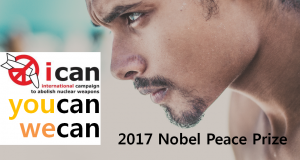 Nobel prize is always famous. At this time of every year, the news of winning the award are abuzz. This year was no exception. This year, the Norwegian Nobel Committee decided to award the Nobel Peace Prize for 2017 to ICAN. ICAN is the abbreviation for International Campaign to Abolish Nuclear Weapons. Nobel Committee said “They are receiving the award for its work to draw attention to the catastrophic humanitarian consequences of any use of nuclear weapons and for its ground-breaking efforts to achieve a treaty-based prohibition of such weapons.” But still many people wondered ‘Why ICAN?’. I can understand them. Because me too.
Nobel prize is always famous. At this time of every year, the news of winning the award are abuzz. This year was no exception. This year, the Norwegian Nobel Committee decided to award the Nobel Peace Prize for 2017 to ICAN. ICAN is the abbreviation for International Campaign to Abolish Nuclear Weapons. Nobel Committee said “They are receiving the award for its work to draw attention to the catastrophic humanitarian consequences of any use of nuclear weapons and for its ground-breaking efforts to achieve a treaty-based prohibition of such weapons.” But still many people wondered ‘Why ICAN?’. I can understand them. Because me too.
“The said interest shall be divided into five equal parts, which shall be apportioned as follows: /- – -/ one part to the person who shall have done the most or the best work for fraternity between nations, the abolition or reduction of standing armies and for the holding and promotion of peace congresses.” – the will of Alfred Nobel
Why can ICAN win?
ICAN is a coalition of non-governmental organizations in one hundred countries promoting adherence to and implementation of the United Nations nuclear weapon ban treaty. It has 468 partner organizations in 101 countries(by ICAN homepage) The amazing thing is that ICAN was launched on April 2007! Now do you understand? There are a lot of peace groups to contribute really hard toward the world. Just last year, there are a lot of a prominent candidates. It is a last year posting of Nobel peace prize. Here : 2016 Nobel peace prize : Colombia peace agreement “It is passed. Now remaining task is ‘implementation’ Finally we could know ‘The Norwegian Nobel Committee want to tell something‘. The message is about nuclear weapons. The North Korean leader Kim Jong-Un maybe contributed much to Nobel Peace Prize.
What is ground-breaking efforts?
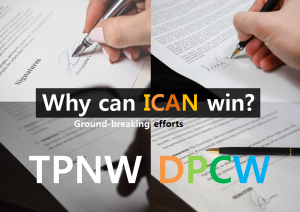 ICAN was formed by the International Physicians for the Prevention of Nuclear War which won the Nobel peace Prize in 1985. Their mission is to turn atmosphere of disarmament debate. Founders of ICAN were inspired by the success of the International Campaign to Ban Landmines. Successfully on 7 July 2017, The Treaty on the Prohibition of Nuclear Weapons (TPNW) is adopted at the United Nations by a vote of 122-1! The ICAN said ‘TPNW‘ is “a landmark international agreement that outlaws, categorically, the worst weapons of mass destruction and establishes a pathway to their elimination.”
ICAN was formed by the International Physicians for the Prevention of Nuclear War which won the Nobel peace Prize in 1985. Their mission is to turn atmosphere of disarmament debate. Founders of ICAN were inspired by the success of the International Campaign to Ban Landmines. Successfully on 7 July 2017, The Treaty on the Prohibition of Nuclear Weapons (TPNW) is adopted at the United Nations by a vote of 122-1! The ICAN said ‘TPNW‘ is “a landmark international agreement that outlaws, categorically, the worst weapons of mass destruction and establishes a pathway to their elimination.”
But since adoption, it was criticized for non-binding.
Reaction of The United States and Russia
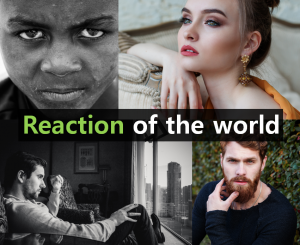 The U.S. reacted coldly. The U.S. State Department said “Unfortunately, we are seeing a deterioration in the overall security environment and growing nuclear capabilities of certain states. This treaty will not make the world more peaceful, will not result in the elimination of a single nuclear weapon, and will not enhance any state’s security.” The U.S., Britain and France said the prohibition wouldn’t work and would end up disarming their nations.
The U.S. reacted coldly. The U.S. State Department said “Unfortunately, we are seeing a deterioration in the overall security environment and growing nuclear capabilities of certain states. This treaty will not make the world more peaceful, will not result in the elimination of a single nuclear weapon, and will not enhance any state’s security.” The U.S., Britain and France said the prohibition wouldn’t work and would end up disarming their nations.“This treaty will not make the world peaceful“
The head of the Russia Federation Council Committee on international Affairs Konstantin Kosachev said, “This is now the real front of struggle for peace, not the romance of a nuclear-free future we all, probably, too would like to.” Also it is“not only misleading but also very dangerous opinion, which stimulates the proliferation of weapons and undermines the process of international disarmament.”
HWPL’s DPCW vs TPNW
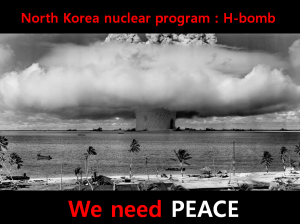 First, TPNW vs NPT
First, TPNW vs NPT
- There is the distinction between states entitled to possess such weapons and non-nuclear weapon states in NPT. But in TPNW it is not.
- The TPNW also forbids states party to the treaty from allowing “any stationing, installation or deployment” of nuclear weapons on their territory, a prohibition that is not explicitly included in the NPT
- States party to the TPNW are prohibited from conducting nuclear tests, while the Comprehensive Nuclear Test-Ban Treaty (CTBT) has not yet entered into force
Beyond Nuclear Disarmament
Do you know HWPL‘s DPCW(the Declaration of Peace and Cessation of War)? The purpose of DPCW is to end the war. If so, the nuclear disarmament is a natural consequence. Actually DPCW has an article of elimination of nuclear weapons. I know many people think it is a naive desire. But the success of ICAN already show you ‘the world is changing‘. Simply we just walked the path to peace.
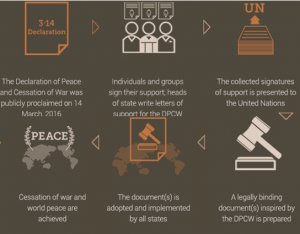
- DPCW Article 1 – Prohibition of the threat or use of force
- 3. States should prohibit any act or threat of violence, whatever its motives or purposes, that occurs for the advancement of an individual or collective criminal agenda.
- DPCW Article 2 – War potential
- 2. States should not produce, assist in, encourage, or induce; the production of weapons of mass destruction, inter alia, chemical, biological, and nuclear weapons, or weapons capable of causing indiscriminate or widespread and unnecessary suffering, or weapons incompatible with international humanitarian law.
- 3. States should take measures to ensure that existing weapons of mass destruction, weapons capable of causing widespread and unnecessary suffering and weapons incompatible with international humanitarian law are gradually dismantled or destroyed. States should cooperate in disarmament and the reduction of arms stockpiles, ideally under international supervision. Decommissioned weapons manufacturing facilities should be repurposed, so that they may serve purposes that are beneficial to humanity in general.
“To live according to a Heavenly culture is to live according to the principles and values of heaven, a place that gives light, rain and air without boundaries.” – the chairman of HWPL